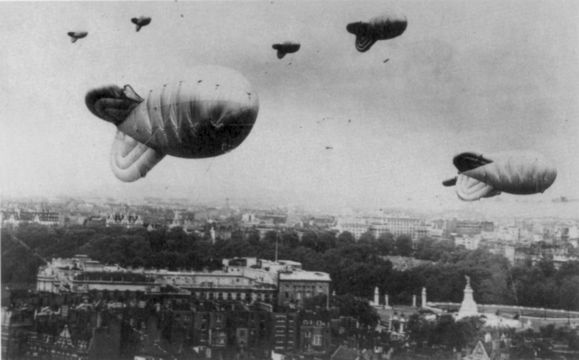
Barrage balloons over London during World War II.Air Publication 3003 - A Brief History of the Royal Air Force
What does the Second World War term Blitz Spirit mean? And why is it brought up during every public crisis that hits the UK?
For 57 days in 1940, during World War II, the Germans rained down bombs on Britain for a staggering 57 days as the people weathered the devastation their team spirit and comradery became known as the "Blitz Spirit". As British Prime Minister Boris Johnson has called on all people in the United Kingdom to stay at home during the COVID-19 pandemic we look at the Blitz Spirit and weather it's alive and well today.
The Oxford English Dictionary defines the Blitz Spirit as "British Stoicism and determination in a difficult or dangerous situation, especially as displayed by a group of people." On Sept 7, 1940, the air-raid sirens rain out and the bombing would continue for eight months.
Read more: The hunt for World War II's Bismarck
The Nazis rained hell over 11 major cities across the British Isles — including London (which took most of the damage). Their hope was that they would diminish British morale to the point of surrendering, just months after the Dunkirk evacuation.
Cities were all but annihilated, food was scarce and disease rampant. Up to 43,000 civilians were killed. However, after the attacks, still, only three percent of Londoners thought the Allies would lose the Second World War.
During the attacks most British simply kept calm and carried on. While abiding by air-raid shelter rules, rationing and carrying on everyday life, as much as possible.
By May 1941, the Germans had ceased the attack on the British Isles. They turned their eyes to Operation Barbarossa (the invasion of the Soviet Union). The British had successfully repelled an invader with sheer determination and grit.
Now in 2020, the British are faced with another foe. This time the Coronavirus disease COVID-19. Today, an opinion piece in the Guardian points out that whenever Britain is faced with a threat, for example, the 2005 terrorist bombings in London, the term the Blitz Spirit is evoked. However, what is constantly overlooked is the deep trauma the people of Britain suffered during the constant bombing.
They write:"Government researchers found that what people wanted most was sound information, the promise of welfare and rehabilitation, and somewhere to sleep. The sight of destroyed buildings, corpses and body parts was utterly alien to daily life. The trauma this produced was largely unrecorded, and certainly untreated."
Read more: Covering D-Day - An Allied Journalist's Perspective
A study "The Mental Stability of Hull" is cited as finding that "case studies showed that people developed serious psychosomatic conditions, including involuntary soiling and wetting, persistent crying, uncontrollable shaking, headaches, and chronic dizziness; men were found to indulge in heavy drinking and smoking after a raid, and prone to developing peptic ulcers. One woman was bombed out of three different houses and watched the death of her sister and her five children. Her symptoms indicated an exceptional level of nervous collapse."
They conclude that "The government papered over the evidence of the physical and psychological effects of being bombed and focused instead on the stories of British resolve. The propaganda film London Can Take It! reinforced the view that British people were not to be terrorised into submission."
While the British, of course, have what it takes to survive and thrive during the pandemic it seems that the Blitz Spirit is not to be romanticized. The Guardian opinion piece makes the point that the phrase "has become divorced from historic reality...The blitz is part of a bitter, violent past, not an appropriate metaphor for the problems of the 21st century."
What do you think? Should we stop referring to the Blitz Spirit during times of hardship?





Comments